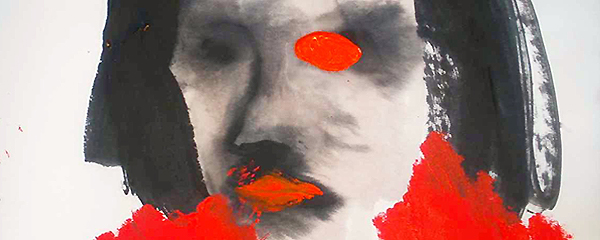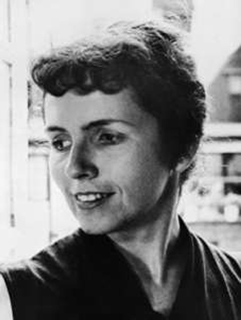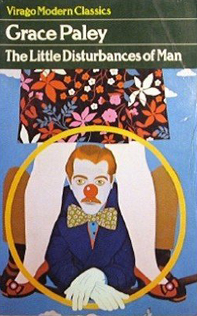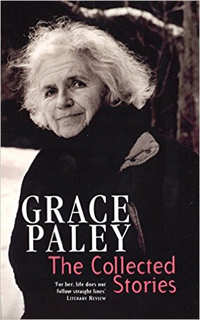
photo © Shohei Hanazaki, 2009
by Kate Jones
Grace Paley is reported to have said: “You become a writer because you need to become a writer – nothing else.” Despite her humble beginnings, Grace Paley clearly needed to become a writer. Not great novels or political satire; not popular romance or crime fiction, but stories of ordinary, everyday lives – the lives of her people – the men and women she saw and lived amongst growing up on the Lower East Side. The unglamorous, nitty-gritty of people’s lives during war and peacetime.
Paley’s parents, Isaac and Manya Goodside, were Russian immigrants, her father having spent time in one of the Tsar’s prisons. They escaped to the United States in 1905, settling amongst many other Eastern-European Jews on the Lower East Side.
By the time Paley was born in 1922, her family had elevated themselves to a home in the Bronx, considered at the time to be a primarily Jewish middle-class area. She grew up in an extended family that included her paternal grandmother, an aunt and two teenage siblings. Paley herself was reported to have confessed to feeling very much fussed over and encouraged to achieve.
One of her early stories, ‘The Loudest Voice’, reveals a similarly self-confident child, Shirley Abramovitz, as she steals the show in her school’s Christmas pageant:
There is a certain place where dumbwaiters boom, doors slam, dishes crash; every window is a mother’s mouth bidding the streets shut up, go skate somewhere else, come home. My voice is the loudest.
 Although Paley attended Hunter College and, briefly, New York University, she abandoned her education to marry Jess Paley in 1942. Jess Paley, a cameraman and film-maker, was serving in the army and the early years of their marriage involved Grace Paley living in army camps, mostly among other women in the same position. It was while living among so many ‘ordinary’ women that Paley had the revelation that their lives were of great importance, and observed that they were often ignored in literature. It was then that Paley began writing – though at first she wrote poetry rather than stories.
Although Paley attended Hunter College and, briefly, New York University, she abandoned her education to marry Jess Paley in 1942. Jess Paley, a cameraman and film-maker, was serving in the army and the early years of their marriage involved Grace Paley living in army camps, mostly among other women in the same position. It was while living among so many ‘ordinary’ women that Paley had the revelation that their lives were of great importance, and observed that they were often ignored in literature. It was then that Paley began writing – though at first she wrote poetry rather than stories.
“I was very surprised by how well I was received. My experience was that men’s writing was interesting, and I really thought that for most people the lives of women would be very narrow in their appeal.”
~ Kaminsky & Towler, Poets and Writers, 2008
Paley was still writing poetry following the end of the war, when she gave birth to her two children: Nora, in 1949, and Daniel, in 1951. It was throughout the 1950s, whilst raising her young children, that she began writing short stories.
Although she tinkered with novels, she stuck with the short story form. Remarkably, despite having come slightly late to the idea of writing, her unique voice and style was evident from the beginning. Clearly, the time spent among her peers in the army camps, as well as her upbringing in the mainly Jewish Bronx, had given her a unique perspective from which to find her distinctive voice:
Finally the day came, I no longer could keep my tact in my mouth. I said: “Vlashkin, I hear by carrier pigeon you have a wife, children, the whole combination.”
~ from ‘Goodbye and Good Luck’
Paley’s first collection, The Little Disturbances of Man, published in 1959, was greeted by critics in tones usually reserved for masters of the form. Philip Roth, hailed by critics for his own writing, praised Paley’s style as having a ‘backhanded grace and irony all its own’.
Following the publication of her first collection, Paley won many fellowships and awards, yet it was to be another fifteen years before she released the second of her short story collections, Enormous Changes at the Last Minute, in 1974.
During the interim period, Paley had been taking care of the important business of raising her children, and teaching at Sarah Lawrence College in New York, where she taught for over twenty years. Following her divorce from Jess Paley in 1971, she married writer Robert Nichols, in 1972. But it rather than her relationships, it was her involvement in political activism that took her away from her writing and claimed much of her time.
Paley became an active participant in the opposition of the Vietnam War, including taking part in demonstrations and ‘sit-ins’, risking getting trampled by mounted police. She was a staunch pacifist, becoming an active member of the War Resisters Movement during the 1960s, and getting involved in other campaigns throughout her life, such as nuclear proliferation, apartheid in South Africa, and the Iraq war.
 She was also, importantly, a feminist. As one of the first American writers to comment on the lives of ordinary women in her stories, she became a role model for women writers emerging in the 1960s and 70s. Much of her political activism involved the politics of ordinary lives: the women and situations at the very heart of her writing.
She was also, importantly, a feminist. As one of the first American writers to comment on the lives of ordinary women in her stories, she became a role model for women writers emerging in the 1960s and 70s. Much of her political activism involved the politics of ordinary lives: the women and situations at the very heart of her writing.
Her ideas are evident in her fictional alter-ego, Faith Darwin, who appears in her later collections, as well as her slim volume of stories and poetry Long Walks and Intimate Talks. In Faith, Paley paints a portrait of a modern woman, spending much of her time amongst other women, and having affairs with men who often let her down. The writing reveals the confidences shared by the women, of raising children, of men and of ageing parents. These are stories that continue to resonate.
I wanted to stop and admire the long beach. I wanted to stop in order to think admiringly about New York. There aren’t many rotting cities so tan and sandy and speckled with citizens at their salty edges. But I had already spent a lot of life lying down or standing and staring. I had decided to run.
~ from ‘The Long Distance Runner’
In Paley’s introduction to her 1994 Collected Stories, she recalls ‘Two Ears, Three Lucks’, which she saw as being the catalysts to her becoming a successfully published writer. The ‘ears’ refer to her ability to listen for the voices and stories around her. She about this in the introduction to The Collected Stories:
…the street language and the home language with its Russian and Yiddish accents, a language my early characters knew well, the only language I spoke. Two ears, one for literature, one for home, are useful for writers.
She claims she began writing her stories more seriously due to a series of good ‘lucks’ which occurred in the 1950s. The first of these was falling sick. This ensured that her children were kept in after-school care long enough for her to spend whole days sitting at her living room table typing or writing. It was at this time she began and completed her short story ‘Goodbye and Good Luck’, shortly followed by ‘The Contest’. Both stories featured in her first collection in 1959.
The second ‘luck’ Paley refers to is that of meeting with Ken McCormick, editor of Doubleday publishers. In a scenario that might come from one of her stories, this man was the husband of a female friend, another mother, who had convinced him to read some of Paley’s work. He did, and vouched that they were publishable, though he advised her to write a novel next, as they were easier to sell, of which she said: ‘I tried for a couple of years. I failed.’
 Paley claimed, that the third ‘big luck’ came in the form of political movements. She felt that every woman writing at this time in history was swimming within the feminist wave, and that the growing feminist movement buoyed and supported women writers like never before: ‘History that happens to you while you’re doing the dishes.’
Paley claimed, that the third ‘big luck’ came in the form of political movements. She felt that every woman writing at this time in history was swimming within the feminist wave, and that the growing feminist movement buoyed and supported women writers like never before: ‘History that happens to you while you’re doing the dishes.’
The 1994 collection of short stories was a finalist for both the Pulitzer Prize and the National Book Award. Living between Thetford, in Vermont, and Manhattan during the 1980s, Paley was the first state author of New York between 1986 and 1988, and between 2003 and 2007 served as Poet Laureate of Vermont. She died in August 2007 of breast cancer, though in the year leading up to her death she still gave readings and made public appearances. The stories she left behind tell the tales of the everyday, ordinary people, often women, who live and breathe both on and off the page. They are as vital and important today to our understanding of the way we live and relate to one another as they were when she began writing.


One thought on “Two Ears, Three Lucks: A Profile of Grace Paley”
Comments are closed.